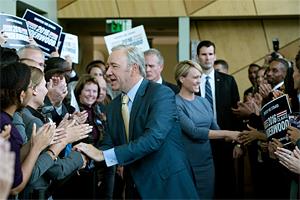[Editor’s Note: Guest Contributor Nic Dobija-Nootens lives in New York and writes about arts, culture, and skateboarding. He often finds himself in the dreaded "show hole" between TV binges and would love if you told him what to watch next. Nic agrees that Arrested Development should never have been cancelled. Online he's known as @noochens]
With Donald Trump’s unprecedented upheaval of U.S. politics, it’s hard to imagine audiences in need of a scripted version of a controversial presidency. But House of Cards Season 5, which Netflix dropped on May 31, is (oddly) a welcome alternative to the dizzying and seemingly unstoppable stream of news coming from the White House.
Over the show’s past seasons, HoC has been inviting audiences to imagine how one power-hungry congressman, Francis Underwood (Kevin Spacey), and his wife Claire (Robin Wright), might technically be able to lie, manipulate, and even kill their way to becoming President and First Lady without going through the tiresome process of actually being elected. To keep the plot tethered to Constitutional reality, the Underwoods have had to continually outdo themselves in the cutthroat department.
Planting news stories to sabotage political opponents quickly escalates to playing with national infrastructure and security as bargaining chips. Those beget forced resignations and outright coups. By the end of the fourth season, the Underwoods are egging on terrorists in order to create one more distraction before voters head to the polls to decide whether to keep President Underwood in office.
Season 5 isn’t the most exhilarating one, but not for a failure to maintain the show’s rapid pace or for the lack of corners the Underwoods are usually painted into. Instead, old characters and storylines from the Underwoods’ past finally catch up with them and begin the process of dismantling one of the most ruthless couples on television.
For the Underwoods to remain in the White House they must not only engineer an incredible election hijacking against a young Republican candidate (which involves faked cyber-attacks, militarized voter suppression, and use of a Constitutional amendment last invoked over 100 years ago), but also outwit the few people left in their world with the power to take them down.
Although Netflix has not confirmed that House of Cards will be renewed for a sixth season, the current season clearly seems to be the beginning of the end for the Underwoods. In his recurring fourth wall addresses to the audience, Frank reminds viewers that his initial goal at the beginning of the series was less ambitious: to secure a position as Secretary of State. When he was passed over for that role by the then newly elected President Garrett Walker, Frank decided more or less out of spite that he would overtake Walker and become President himself, which he achieved at the end of Season 3.

Now, having spent a full season as President, Frank suggests that his yawning appetite for victory and power may soon take him somewhere beyond the White House. If Frank can win the election and secure a full term as President for himself, he won’t rest. Instead, he’ll have to figure out what his next conquest will be, and that journey may lie outside the scope of the show entirely, maybe making a natural boundary – and end – for the HoC saga.
This season of House of Cards was written before the 2016 presidential election, but there have been moments where the Underwood and Trump administrations have crossed paths.
Early in the season, while Frank is hyping up the threat to Americans of the terrorist group ICO (Islamic Caliphate Organization), he issues an executive order restricting entrance into the U.S. for a broad swath of non-citizens. While the ban resembles Trump’s order to turn away travelers from a list of Muslim-majority countries, Frank’s order appears actually to be better thought out and coordinated. We see Frank arguing over it with his Secretary of State and telling her to have it vetted by White House legal counsel before putting it in place. Trump’s order, however, was reportedly signed into action without input from the Department of Justice’s Office of Legal Counsel and implemented without entirely briefing the Customs and Border Protection agents charged with enforcing it.
There are other echoes of 2016. When the Underwoods coerce a hacker to manipulate social media feeds in order to promote pro-Underwood ads in insecure voting areas, they give a heavy nod to the influence of social media-based news (and not dissimilar to the fake news operations in this year's Homeland.)
These headline doppelgangers are now indispensable in scripted TV – and help ground House of Cards and make it a more penetrating political drama.
When House of Cards premiered in February 2013, a month after Barack Obama began his second term as President, the country’s political climate was contentious but relatively par for the course. Against that backdrop, House of Cards had to be big and brash to stand out.
Today, with an administration that is unconventional, to say the least, as well as ongoing investigations into potential election interference by a nuclear adversary, House of Cards has done well this season to temper its action with more understated power struggles. The show’s continuing ability to churn out exciting but nuanced political drama has been impressive.
Hopefully, if HoC goes another (or two) seasons, it will stick to the tone established here in Season 5.
Either way, while Trump might be the ultimate reality candidate, the Underwoods have been the ultimate scripted ones.